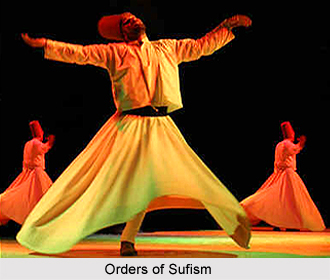 There are four main Orders in the philosophy of Sufism and the Orders are mainly depending upon various ways through which the founders of the Orders spread their message of Sufi philosophy. The Orders have played an important role in the dissemination of the Sufi philosophy in all over the world and some of the great Sufi authors were involved with the foundation of the Orders of Sufism. The authors like Khwaja Abu-Ishak Shami Chishti, Abdul Qadir Gilani, Sheikh Ziaudin Jahib Suhrawardi and Khwaja Bahaudin Naqshband founded the four Orders. The Orders of Sufism are named after their names and they are known as the Chishti Order, the Qadiri Order, the Suhrawardi Order and the Naqshbandi Order.
There are four main Orders in the philosophy of Sufism and the Orders are mainly depending upon various ways through which the founders of the Orders spread their message of Sufi philosophy. The Orders have played an important role in the dissemination of the Sufi philosophy in all over the world and some of the great Sufi authors were involved with the foundation of the Orders of Sufism. The authors like Khwaja Abu-Ishak Shami Chishti, Abdul Qadir Gilani, Sheikh Ziaudin Jahib Suhrawardi and Khwaja Bahaudin Naqshband founded the four Orders. The Orders of Sufism are named after their names and they are known as the Chishti Order, the Qadiri Order, the Suhrawardi Order and the Naqshbandi Order.
Chishti Order: The Chishti Order is an ancient and influential order among the four orders of Sufism within the mystic branches of Islam. It was founded in a small town named Chisht, near Herat, about 930 CE and it has continued to spread with its own glory, till today. The great classical Sufi author, Khwaja Abu-Ishak Shami Chishti, or `the Syrian`, founded the Chishti Order. Abu Ishak was born early in the tenth century and was a descendant of the Prophet Mohammed. The followers of Abu-Ishak are actually a branch of the Line of the Masters that became known as the Naqshbandi or `the People of the Design`, at a later period.
Qadiri Order: The Qadiri Order is considered to be one of the most prominent and influential one among the four Orders of Sufism. The Order or the Path was organised by the followers of Abdul-Qadir of Gilan. Abdul-Qadir Gilan was born in 1077 CE at Nif, in Gilan district, to the south of the Caspian Sea and he died in 1166. The Order is one of the most widespread among the Sufi Orders in the Islamic world and it can be found in the countries like India, Bangladesh, Pakistan and Turkey. It can also be found in the Balkans and in much of the East and West Africa, in Europe and America, as well.
Suhrawardi Order: The Suhrawardi Order is a prominent Sufi Order and was founded by the Sufi saint and philosopher, Sheikh Ziaudin Jahib Suhrawardi. Sheikh Ziaudin lived during the years of 1097-1168 and he was a murid or disciple of the classical Sufi author, Mohamed El-Ghazali. He deeply followed the discipline of the Sufi ancient Junaid and he found the Order in the twelfth Christian century. The Suhrawardi Order has greatly influenced the countries like India, Persia and Africa and the mystical activity of the people of these countries was influenced by the methods and personages of the Order.
Naqshbandi Order: The Naqshbandi Order was named after one of the greatest personages of the dervish school called Khajagan (`Masters`), Khwaja Bahaudin Naqshband. The Order is one of the most prominent and popular one among the Sufi Orders and it rose in Central Asia. The Order greatly influenced the development of the Indian and Turkish empires. The Sufi saints of the Naqshbandi Chain are also called as the `Designers` or the `Masters of the Design`. The Order gave rise to many specialist schools that adopted individual names. According to many scholars, the Naqshbandi Order is the earliest of all the mystical `chains of transmission`.












